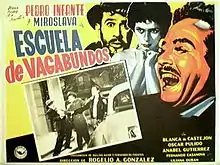School for Tramps
School for Tramps (Spanish: Escuela de vagabundos) is a 1955 Mexican comedy film. It was produced by Fernando de Fuentes. It's considered one of the finest comedies of Mexican cinema, and is adapted from the screenplay for the MGM movie Merrily We Live (1938).
| School for Tramps | |
|---|---|
 | |
| Directed by | Rogelio A. González |
| Produced by | Fernando de Fuentes |
| Written by | adapted by Fernando de Fuentes from 1938 screenplay by John Jevne |
| Starring | Pedro Infante, Miroslava, Oscar Pulido, Blanca de Castejón, Anabelle Gutiérrez, Óscar Ortiz de Pinedo |
| Music by | Manuél Esperón |
| Cinematography | Rosalío Solano |
| Edited by | José W. Bustos |
| Distributed by | Diana Films (1955 release) Televisa Home Entertainment (DVD release) |
Release date | 27 January 1955 (Mexico) |
Running time | 100 minutes |
| Country | Mexico |
| Language | Spanish |
Plot
In a mansion outside a nameless city (apparently Mexico City), lives the wealthy Valverde family: the patriarch Miguel (Oscar Pulido) a business man; Emilia (Blanca de Castejón), his wife, a fun and good-hearted but slightly deranged woman; and their two daughters: the oldest, Susi, short for Susana, (Miroslava) and Lala, a nickname for Laura (Anabelle Gutiérrez). Emilia often picks up tramps in hope to reform them into productive men, but they always disappear stealing anything they can in the house.
In the surrounding woods, Alberto Medina, a famous songwriter, is on a vacation hunting trip. The old car he's driving suddenly starts heating up and shooting vapor through the radiator, Alberto gets out of the car to search for water but the car, not having on the emergency brake, starts going downhill in reverse until it falls off a cliff and gets destroyed, so he has to walk to find help and ends up in the Valverde's home, asking to make a phonecall, but because of his dirty and ragged clothes Emilia takes him for a tramp and invites him to stay with them. After catching a glimpse of Susi (Stern), Alberto accepts, despite the protests of Emilia's family and their butler Audifás, but in the next days he proves to be more than a regular homeless man: helping Miguel when he arrives home drunk, enchanting the heart of Susi, and especially during a business dinner where he secures Miguel a financial investment support from a bank manager, but also making Susi jealous after the manager's daughter, Patricia, insists on dating him the next day.
Alberto ends up having a date with Patricia, first at a country club and later at an undisclosed place. During that day two patrolmen find the destroyed car at the wreckage and find the owner, who confirms that Alberto was driving the car and they assume he died in the accident. Alberto goes back to the Valverde's later that night and realizes he has no key so he falls asleep in the back room. The next morning when they look for Alberto they don't find him in the bedroom, then Miguel reads a note in the newspaper where they are informed he died in a car accident, causing a chaotic chain of faints and madness around the house. During the confusion Alberto finally finds Susi (who fainted first) and kisses her declaring their love after being briefly interrupted by Audifás, who becomes a tramp after seeing all the luck they have.
Cast
- Pedro Infante – Alberto Medina
- Miroslava – Suzi Valverde
- Oscar Pulido – Miguel Valverde
- Blanca de Castejón – Emilia de Valverde
- Anabelle Gutiérrez – Lala Valverde
- Oscar Ortiz de Pinedo – Humberto Vértiz
- Eduardo Alcaraz – Audifás, the Butler
- Fernando Casanova – Mauricio
- Liliana Durán – Patricia Vértiz
- Ramón Valdés – Taxista
- Dolores Camarillo – Pancha, a Servant
Reception and legacy
The film met with positive reviews from contemporary critics upon release and proved to be a commercial success.
During the 1955 Ariel Awards, the film won two Silver Ariels, one for Best Supporting Actress (Blanca de Castejón) and one for Best Young Actress (Anabelle Gutiérrez).
To this date, it is considered one of the most beloved comedy films of all times and it is often broadcast on television. It has the distinction to be the last film premiered during Miroslava's lifetime; she committed suicide five weeks after the film opened.